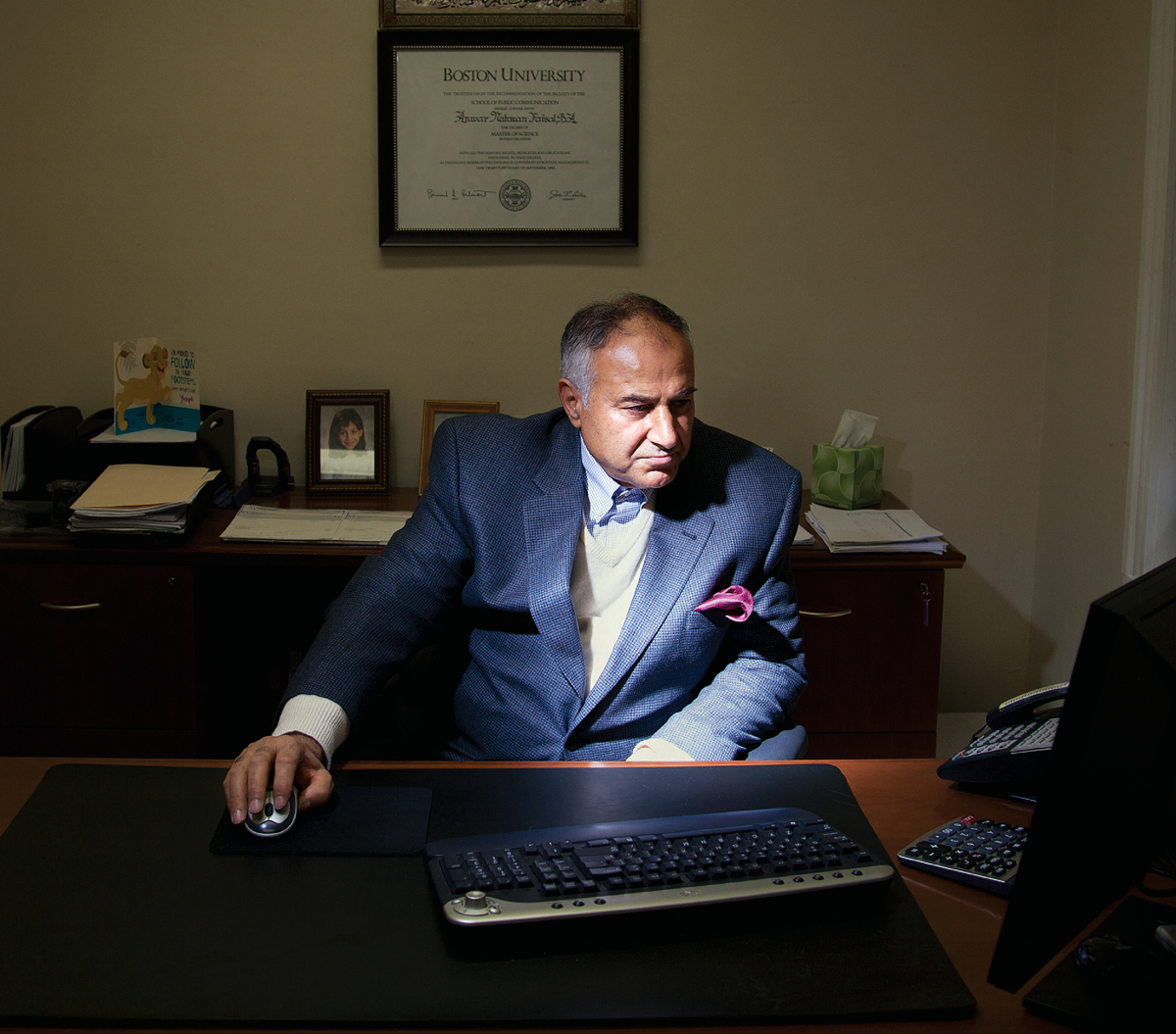Anwar Faisal: Lord of the Sties

Anwar Faisal at the Brookline office of Alpha Management. (Photograph by Dana Smith)
Last September, Faisal agreed to meet me at Alpha Management’s Brookline headquarters, at 1249 Beacon Street. His 2,000-square-foot office has freshly polyurethaned hardwood floors and Oriental runners. When I arrived, several office employees—bookkeepers and real estate agents—sat at new wood desks, the kind you’d find in a Staples catalog. In one corner, a flat-screen TV was tuned to financial news in front of a few upholstered waiting-room chairs. I had never seen a picture of Faisal, and after reading through his ISD complaints, I expected a bullying thug. A few minutes later, an unassuming man lumbered in wearing a pair of well-worn sneakers. He was about 6 feet tall, middle-aged, and slightly disheveled, dressed in a button-down shirt under a maroon sweater. He greeted me warmly in a soft voice punctuated with a broad smile, and said I could ask him anything. Then he told me his rags-to-riches story: the tale of a self-made man who rose from a lowly refugee to a mogul living in a $6 million Brookline mansion, complete with a detached carriage house and a chauffeur’s apartment.
Anwar Faisal was born in 1951 in a Gaza refugee camp. His parents were camel, horse, and donkey traders who had fled their home, along with thousands of their country men, after the 1948 war. Faisal told me he graduated from Ain Shams University, in Cairo, where he attended tuition-free. After trying to find work in Saudi Arabia, he said, he moved to Boston in 1977 with the help of a friend who lived in Salem. He studied English for eight months, then found work as a security guard at a Boston University dormitory at 1106–1110 Commonwealth Avenue, taking advantage of the school’s tuition-remittance program to earn a master’s degree in public relations and mass communications in 1983.
Years later—after he had made quite a bit of money by renting apartments to the types of people he used to watch over—Faisal would have the opportunity to purchase the very dorm where he once worked. It was 2006, and after he acquired the building from the university in a private sale for $8 million, he renamed it “Nora’s House,” after one of his daughters.
But in 1986, still employed as a BU guard and living in a rental at 58 Queensberry Street in the Fenway, he came home one day to find a note had been slipped under his door. The building was being converted to condos, and by law he was being given right of first refusal. Confused, he took the notice to his former history professor, who patiently explained the situation and recommended that Faisal buy the unit. All he needed was $10,000 cash and a full-time job. The minute he closed, Faisal says he was hooked on the high of the deal. “I felt the honey,” he says. He began buying up unit after unit in his building and eventually took over the entire thing.
The mid-1980s, like the mid-2000s, were marked by a credit bonanza—developers happily offered investors second mortgages to offset the banks’ requirements for down payments, meaning that if you had the stomach for risk, you could become a big player without paying out any cash at all. Being highly leveraged didn’t bother Faisal. Fenway was close enough to the universities for his properties to produce a steady rental income through boom times and bust. For the first dozen years of his real estate career, Faisal bought up individual condominiums. (Today he calls this “the biggest mistake I did in my life”—it would have been just as easy, he believes, to have purchased whole buildings.) He told me that he bought “hundreds” of condo units. At the registry of deeds, I was able to find only a few dozen—not hundreds—but I had entered Faisal’s world, where facts are fluid, though the teller is never in doubt.
Three years after his first deal, Faisal heard about an opportunity to buy four studio apartments for $180,000 at 219 Park Drive, a building being converted to condos. There was just one problem: The building owners hadn’t given their tenants the right of first refusal, and were forced to buy back the units. Faisal says he held out his units for several months, eventually earning $100,000 in profit on the deal. It was his first windfall.
Except that’s not what the deeds say. According to the records, Faisal sold the apartments for exactly what he’d bought them for: $180,000. When I asked him about the discrepancy, Faisal told me that he’d made a side agreement with the buyer. To check his story, I contacted Carl Awed Sr., the buyer’s father. He didn’t recall that Faisal had made any money on the deal, but he did refer to him as a “pain in the ass.” He then advised me to call his son, Carl Jr., who might remember. So I reached out to Carl Jr., who told me, “I don’t know who the fuck you are, you know what I mean?” and then apparently left the country for Jamaica.


